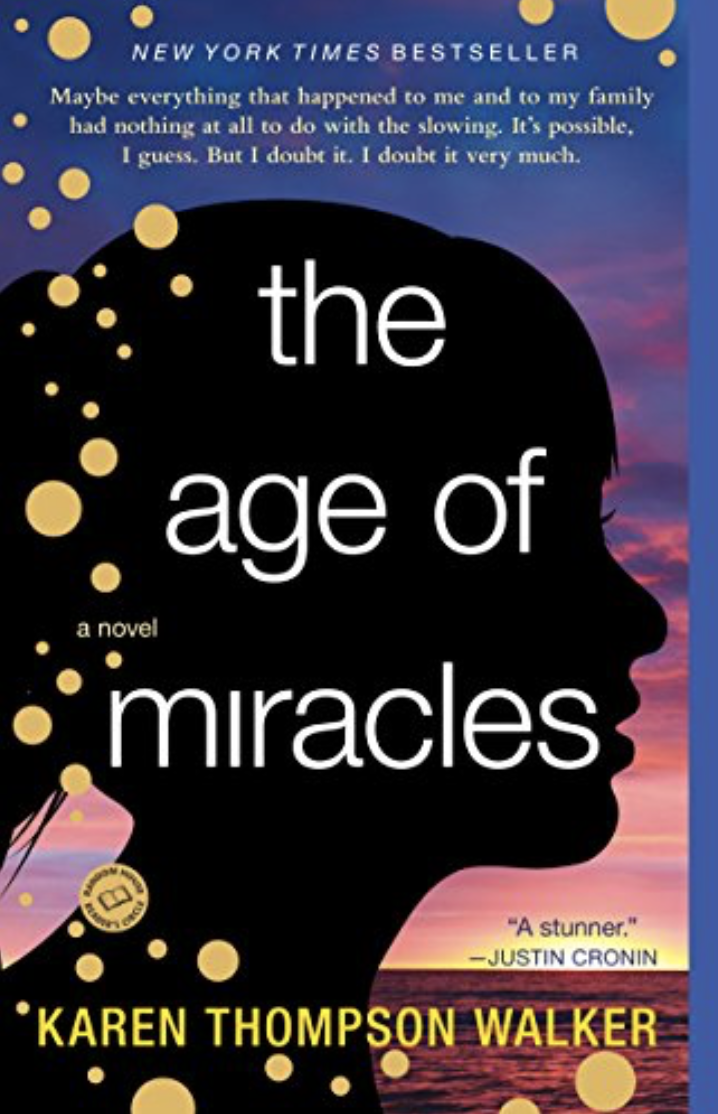
Media we love: The Age of Miracles
Deborah recommends The Age of Miracles
The Age of Miracles by American writer Karen Thompson Walker is apocalyptic fiction. We learn, early in the book, that Earth’s rotation is becoming slower, and then slower, causing daytime and nighttime to stretch out …
And I could imagine that. It was believable, which many say is a key to good fiction. Different bodies in space rotate at different speeds, after all. The science wasn’t perfect (at one point Thompson says a total solar eclipse is called by the moon’s shadow), but that’s okay.
I’d even go so far as to say “The Age of Miracles” is one of my all-time favorite books. And my most recent reading of this book, just as the brutal heat of the Texas summer in 2022 was ending, was my third time through since the book was published, in 2012.
A coming-of-age book
Maybe it’s the voice of the book’s protagonist, Julia – who is age 11 when “the slowing” begins – that has brought me back to this book several times. I recall a time 60 years ago, when I was 11 myself. And Thompson beautifully captures that woman-child’s voice, her deep knowledge of some things and complete bewilderment about others. For example, why, Julia wonders, is she so lonely? She notices that, among her classmates:
Talents were rising to the surface, weaknesses were beginning to show through, we were finding out what kind of people we would be. Some would turn out to be beautiful, some funny, some shy. Some would be smart, others smarter. The chubby ones would likely always be chubby. The beloved, I sensed, would be beloved for life. And I worried that loneliness might work that way, too. Maybe loneliness was imprinted in my genes, lying dormant for years, but now coming into full bloom.
So, set against a backdrop of the slowing of the Earth – a world whose day is at first just fractions of seconds longer, then hours longer, and ultimately weeks longer – Julia comes of age.
Hopeful or sad?
She learns her parent’s relationship isn’t perfect. She learns about love and loss. And she looks around as an 11-year-old girl, then a 12-year-old girl, at a fast-changing world. It’s where birds drop from the skies and people hoard food because the world’s plants are dying. Either the plants are getting too much continuous sunlight, or too little, or both. And all the while, Earth’s spin is getting slower and slower.
I don’t know why, on my first two readings of The Age of Miracles, I came away thinking this book was “hopeful.” It still does seem like a powerful testament to the human spirit that most people in the book just … carry on. They adapt as we humans can adapt, with our technologies as well as in our minds, in the face of profound natural change.
Not our fault
Still, on this reading, at age 71, I couldn’t escape the theme of loss that permeates the book. This time, the book seemed, above all things, sad. That’s true, although, as many have noted, the book is an unusual example of apocalyptic fiction in that the disaster in the book isn’t human-caused. Nobody started a nuclear war. Our human destruction of nature wasn’t the reason. The disaster was totally out of our human hands.
And I don’t want to say much more than that about “The Age of Miracles,” because the book is just so thought-provoking and so fresh, even on the third reading. All I’ll say is that I’ve recommended it over and over to friends, and I highly recommend it to you.

Bottom line: Deborah Byrd recommends The Age of Miracles by American writer Karen Thompson Walker. It’s a fantasy and a coming-of-age book, set against the background of an unexplained natural slowing in Earth’s spin.











